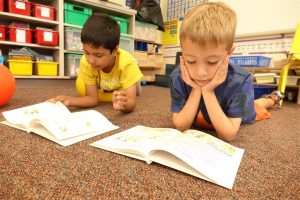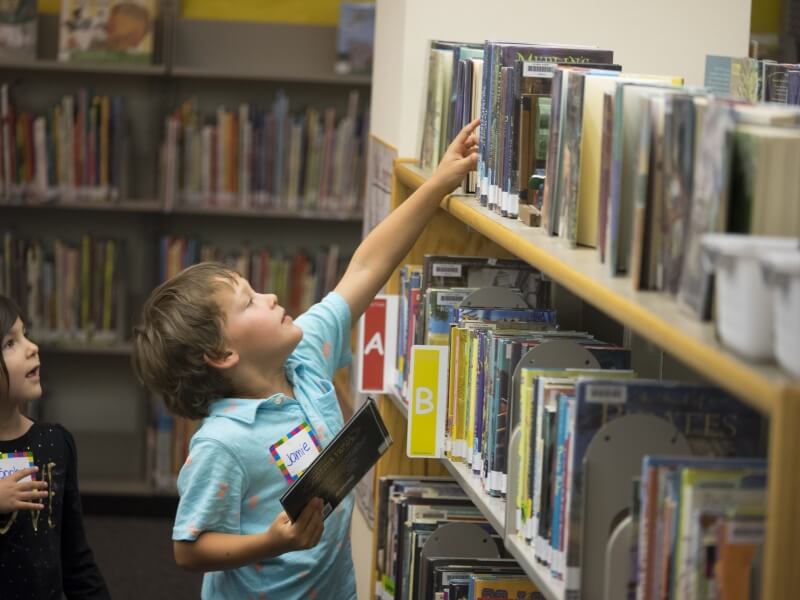 A few years ago, we realized that we could better serve our Lower School students by augmenting classroom teaching with early intervention when we recognized learning struggles. Research indicates that targeted and consistent practice early in a student’s struggles with math and reading significantly increases their likelihood of future success.
A few years ago, we realized that we could better serve our Lower School students by augmenting classroom teaching with early intervention when we recognized learning struggles. Research indicates that targeted and consistent practice early in a student’s struggles with math and reading significantly increases their likelihood of future success.
To this end, we designed our learning specialist/coach positions with three primary goals in mind: to better meet the needs of both our struggling and advanced students in math and literacy, to help teachers enhance their teaching pedagogy, and to advise our review of curriculum and assessment practices. We were fortunate to find the expertise we sought in two CA Lower School homeroom teachers who were interested in moving from the classroom to instructional coaching. We hired Fifth Grade teacher Mary Singer to be our math specialist and First/Second Grade teacher Tina Rivera as our literacy specialist. Between them, they had more than 20 years of homeroom teaching experience and deep knowledge of how children learn.
In this first year, we expected their work would evolve and gradually increase in volume and complexity, which it has. What we couldn’t know until we lived through the year was the tremendously positive impact both Mary and Tina would have on student and teacher support. Students were immediately comfortable seeing familiar faces observing in their classroom and interacting with their teachers during instructional time. Most were willing and excited to participate in learning groups facilitated by Mary and Tina. By this point in the year, students see the specialists as regular and welcome additions to their learning experiences.
In addition, Mary has started math clubs for Third and Fourth Grade students and facilitates Upper School math mentors who sponsor a math club for Fifth Graders. Says Singer, “Being a resource and providing math support to both teachers and students has been exciting and rewarding. Whether I’m pushing into a classroom to co-teach a lesson, or working with students individually or in small groups, my role allows me to meet the dynamic math needs of the Lower School. I’m also very enthusiastic about our new math clubs in grades 3-5. We’ve been able to explore concepts and ideas that are both fun and challenging, and in doing so, have created and excitement about math for our students.”
Mary and Tina began the year understanding the importance of building a new rapport with their colleagues in their new roles as instructional specialists and coaches. They wanted to be perceived as shoulder-to-shoulder, collaborative allies, not evaluators of teacher performance. As we had hoped, teachers were receptive of their gentle, respectful style and sought their expertise and support. In addition to their instructional work with individual and small groups of students, Tina and Mary are busy on a daily basis observing, planning and co-teaching with teachers in all grades. Recently, both specialists have embarked on month-long coaching cycles with certain grade-level teacher teams that involve a deep analysis of curriculum, teaching effectiveness, and student work. We believe, and research supports, that this deeper coaching will lead to significant and lasting changes for teachers. By addressing the needs of individual students and focusing on actual student work, teachers can see how their growth positively impacts student achievement and skill development. Tina shares, “This work has allowed us to streamline and fine tune our teaching so that we can continually improve as professionals. As a result, we maintain our student-centered approach and are more intentional about the way we deliver the content in the Lower School.”
Reading Support teacher Ana Dodson has worked with Tina to serve children who are struggling with specific reading concepts. We know that early intervention with Kindergarten-Grade 2 students allows children to work on a daily basis to master skills that have proven difficult. These groups are flexible and change depending on the skill that needs to be remediated. In Upper Elementary, Tina works four times per six-day rotation with children who have the greatest need. With this group, she presents the English language “code” in a structured, multi-sensory approach. For these students, the frequent targeted practice we are now able to provide through the literacy specialist and support teacher gives them optimal opportunities to overcome their challenges and become confident readers.
We look forward to continuously improving math and literacy teaching and learning in Lower School. We expect to be able to document a positive impact on student achievement in both areas as coaches gain knowledge and experience, and as teachers, coaches, and administrators learn and work together over time. We are excited and energized to bring all of our resources and talents to this task.
